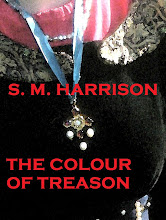And yesterday The Tudor Group were there presenting a Tudor wedding, complete with wedding breakfast, Tudor games and dancing. I was so impressed by the Tudor Group; their kit is amazing, their research thorough and their knowledge extensive and it was great to chat about the similarities and differences between 'our' periods.
We talked about the etiquette and ceremony of a Tudor (or medieval) feast - the luxury of choice, the reverence with which the servants treated their betters, even when encountered in the garden (reminded me of Kim Phillips' excellent paper on the Earl of Warwick at Middleham) and the pride with which the household liveried retainers wore their badges.
Servants bring the first dishes.
Double linen and the best majolica for the top table!
The 'Bride Cake'.
Children weren't allowed to sit until they showed enough maturity to do so!
And of course The White Queen was mentioned - why? Because you won't see any of this in the BBC dramatisation (we talked about actors' reluctance in wearing hats or in Max Irons' case not adopt the hairstyle either!). Such a shame that the actors and producers missed a wonderful opportunity to educate as well as entertain the public as the Tudor Group did so brilliantly.
Dancing in the garden.
Reference:
Kim M. Philips Journal of Medieval History 31 (2005) 143 'The Invisible Man: Body and Ritual in a fifteenth-century noble household.









